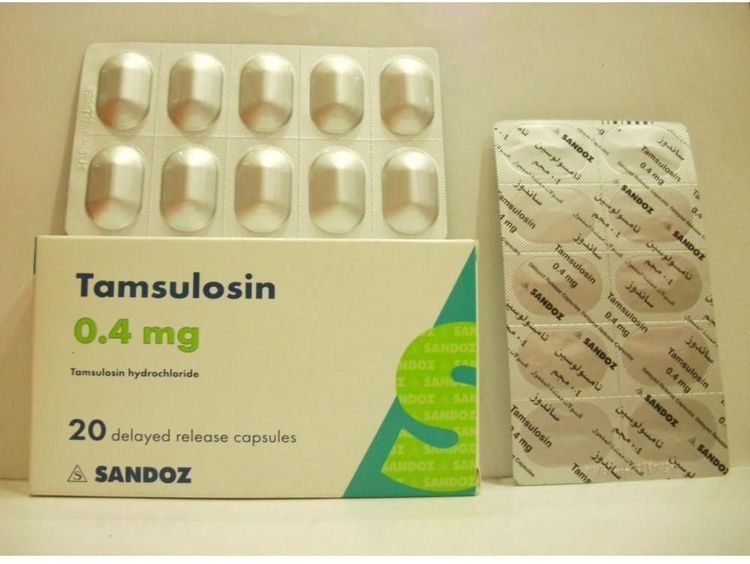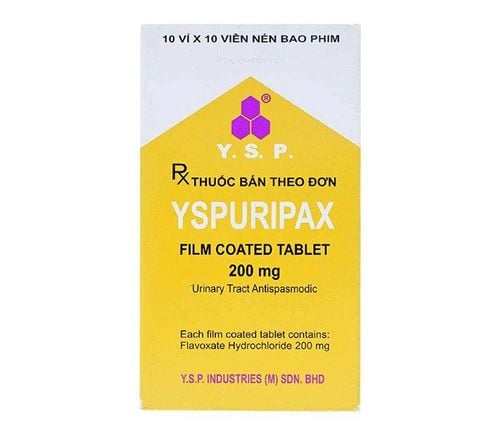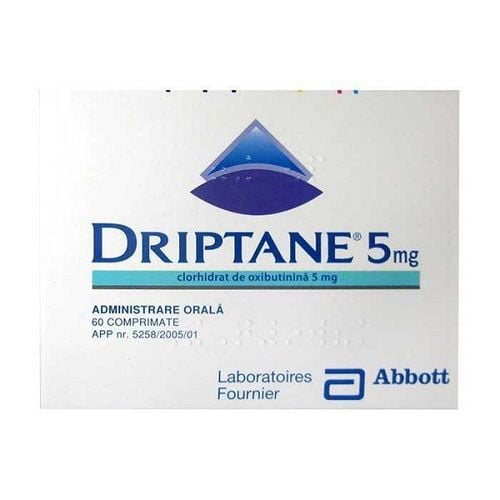This is an automatically translated article.
Posted by Pharmacist Huynh Xuan Loc - Faculty of Pharmacy - Vinmec Central Park International General Hospital
Tamsulosin is a selective alpha 1 - adrenergic receptor antagonist that relaxes prostate and urethral smooth muscle. To ensure the effectiveness of treatment, patients need to strictly follow the instructions of the doctor or pharmacist.
1. How does Tansulosin work?
Tamsulosin, with the common brand name Harnal Ocas, is a selective alpha 1 - adrenergic receptor antagonist that relaxes prostate and urethral smooth muscle. Tamsulosin makes urine easier to pass and reduces symptoms of dysuria in patients with benign prostatic hyperplasia (BPH).In this disease, the enlarged prostate will press on the urethra and interfere with urine flow. Therefore, the patient will often have difficulty initiating urination or urinating less often accompanied by frequent urination. Tamsulosin does not help reduce the size of the prostate gland, but only helps to reduce the symptoms of the disease, thereby helping to improve the patient's quality of life.
2. Reasonable use of Tamsulosin
Tamsulosin is a prescription drug, so it can only be used when prescribed by a urologist. Self-medication can increase the risk of side effects or harmful drug interactions, as well as not controlling the severity of the disease or not detecting other conditions with similar symptoms.

Sử dụng hợp lý thuốc Tamsulosin giúp giảm nguy cơ mắc các tác dụng phụ
If the patient is scheduled to have eye surgery to treat conditions such as cloudy eyes (cataracts, cataracts), glaucoma (glaucoma), it is necessary to inform the ophthalmologist whether he is taking or has taken tamsulosin. in recent times. Because Tamsulosin can cause Intraoperative Floppy Iris Syndrome (IFIS), a serious eye complication. Ophthalmologists will consider medication options and surgical techniques to prevent this complication. Patients should also talk with their urologist to decide whether to continue or temporarily stop Tamsulosin during the scheduled surgery.
Tamsulosin can interact with other drugs to change the effectiveness of treatment or give rise to unwanted effects. Therefore, the patient needs to list the drugs currently or recently used with the doctor to have the right choice. Drugs to watch out for include:
Diclofenac (an anti-inflammatory pain reliever) or warfarin (an anticoagulant) due to interactions that speed up the elimination of tamsulosin from the body; Verapamil, Diltiazem (antihypertensives, antiarrhythmics) due to the interaction that increases the concentration of these drugs; Ketoconazole, Itraconazole (antifungal drugs) by increasing the concentration of Tamsulosin in the blood; Other alpha 1 - adrenergic receptor antagonists such as doxazosin, indoramin, prazosin, alfuzosin due to the risk of interactions increasing the side effects of hypotension; Anesthetics during surgery or dental procedures due to the risk of hypotension. Changes in the rate of elimination or in the blood concentrations of these drugs may interfere with treatment as well as increase the risk of adverse events in patients receiving concomitant therapy.
3. Possible side effects when taking Tamsulosin
Like all drugs, Tamsulosin also has the potential to cause side effects in a small group of people. Serious side effects are rare or very rare, however, if they occur, the drug should be discontinued and medical facilities immediately available for timely treatment. Reactions that require special attention include:
Allergic reactions, severe inflammation suddenly appearing on the skin or mucous membranes (rash, redness, scaling ...) Edema on the skin, around the mouth or in the oral mucosa, pharynx; Uncontrollable prolonged erection with symptoms of pain, tension; Severe skin redness. In addition, two more common and less serious adverse reactions (incidence = <10%) included dizziness, especially with sudden changes in position, or ejaculation disorder (inability to ejaculate semen). body but back to the bladder). This retrograde ejaculation is harmless.
Other possible side effects include tachycardia, headache, constipation, nausea, vomiting, stuffy or runny nose... in less than 1% of users.
Tamsulosin has not been reported to affect the ability to drive and use machines, however blurred vision, dizziness or fainting may occur in some users.
Patients should be aware of these or other suspected drug-related side effects and notify their physician at regular or earlier follow-up visits if symptoms persist and affect quality of life.

Uống thuốc tamsulosin có thể gây ra tác dụng phụ phát ban, mẩn đỏ da
4. Notes when using Tamsulosin medicine
Use the medicine as directed by the doctor normally 1 time per day; Patients should not arbitrarily change the dose of the drug without consulting the treating doctor. Tamsulosin tablets are swallowed whole with water or other liquid drinks, do not chew or crush because it interferes with the absorption of the active ingredient.
If the patient forgets to take the medicine, take the dose again on the same day. If it has been more than 24 hours since the missed dose, take the new day's dose. Do not take a double dose for the missed dose. In case of drug overdose by mistake, the patient should immediately go to a medical facility for timely support.
Tamsulosin is not intended for use in women unless specifically determined by the treating physician. Besides, Tamsulosin is a prescription drug, so it can only be used when prescribed by a urologist. Therefore, patients should not self-medicate, but should take the drug exactly as prescribed by the doctor.
Please dial HOTLINE for more information or register for an appointment HERE. Download MyVinmec app to make appointments faster and to manage your bookings easily.













